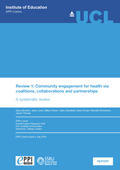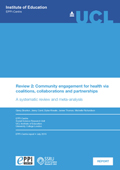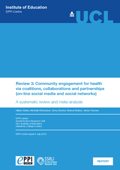What do we want to know?
Our understanding about the use and effectiveness of community engagement as a strategy to improve health is constantly changing. Community engagement can be considered the ‘direct or indirect process of involving communities in decision-making and/or in the planning, design, governance, and delivery of services using methods of consultation, collaboration, and/or community control’ (O’Mara-Eves et al. 2013). While evidence suggests that community engagement in interventions is beneficial, little is understood about the components of community engagement and the contribution of active content to health and social outcomes.
Who wants to know?
This project was commissioned by National Institute for Health and Care Excellence (NICE) in order to provide updated evidence to inform NICE community engagement guidance. This was undertaken as an update and expansion of a previous EPPI Centre review of community engagement (O’Mara-Eves et al. 2013).
What did we find?
A higher extent of community engagement was associated with larger behavioural outcomes, i.e. where community members design and deliver and evaluate health interventions. A higher extent of engagement across design, delivery and evaluation was noted in studies where community engagement processes included bidirectional communication, collective decision-making and intervention delivery training support to community members. Effective components of community engagement generally include peer or lay delivery, but this alone was not enough to guarantee positive outcomes. Community engagement is utilised within social media/social networking intervention delivery, but in delivery alone, not in design or evaluation, suggesting that very little co-creation of knowledge or building of social capital is occurring. There is a research gap in evaluations focused on children, those aged 30 to 40 years and on older people. Meta-analyses suggested evidence of very small mixed effects across studies; and qualitative comparative analysis found that interventions utilising online facilitators were used more often in studies with positive effects.
What are the implications?
These findings confirm earlier syntheses suggesting that overall, community engagement is a valuable way to improve public health. Further, future evaluation of community engagement processes such as bi-directional communication, collective decision-making and training to support intervention delivery could develop a path showing how specifically to improve outcomes. Peer or lay intervention delivery, as a form of community engagement, is found more often in successful interventions, but its use alone does not guarantee success. Social media and social network involves very little community engagement and as yet provides little estimable return.
How did we get these results?
We undertook a systematic review to:
- map the literature using framework synthesis methods;
- focus in-depth synthesis on trials evaluating interventions with coalitions, collaborations or partnerships, using framework synthesis, meta-analysis/ meta-regression and qualitative comparative analysis; and
- conduct a framework synthesis, meta-analysis and meta-regression and qualitative comparative analysis on trials focused on social media and social networking interventions.
 |
|
Review one
This report should be cited as:
Brunton G, Caird J, Stokes G, Stansfield C, Kneale D, Richardson M, Thomas J (2015) Review 1: Community engagement for health via coalitions, collaborations and partnerships: a systematic review. London: EPPI Centre, Social Science Research Unit, UCL Institute of Education, University College London.
ISBN: 978-1-907345-74-6
|
 |
|
Review two
This report should be cited as:
Brunton G, Caird J, Kneale D, Thomas J, Richardson M (2015) Review 2: Community engagement for health via coalitions, collaborations and partnerships: a systematic review and meta-analysis. London: EPPI Centre, Social Science Research Unit, UCL Institute of Education, University College London.
ISBN: 978-1-907345-78-4
|
 |
|
Review three
This report should be cited as:
Stokes G, Richardson M, Brunton G, Khatwa M, Thomas J (2015) Review 3: Community engagement for health via coalitions, collaborations and partnerships (on-line social media and social networks): a systematic review and meta-analysis. London: EPPI Centre, Social Science Research Unit, UCL Institute of Education, University College London.
ISBN: 978-1-907345-79-1
|